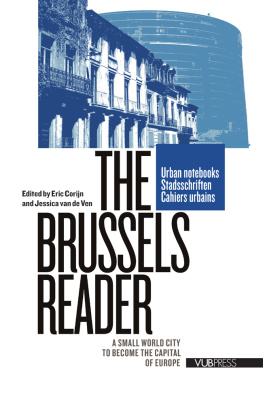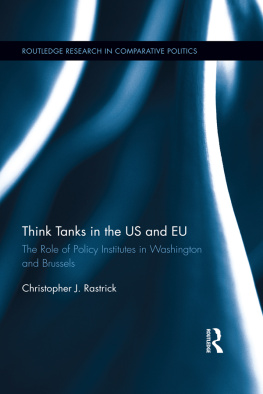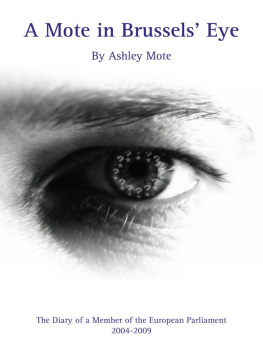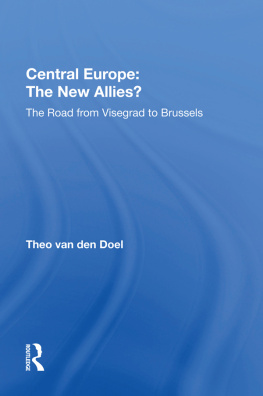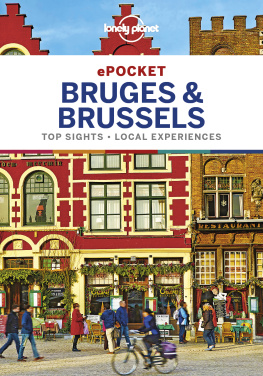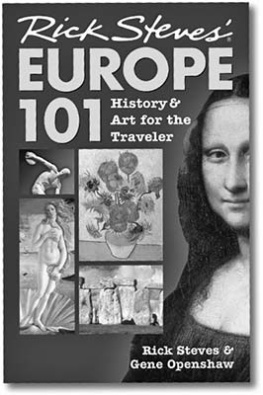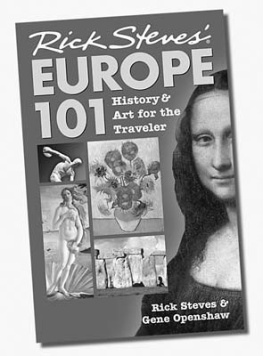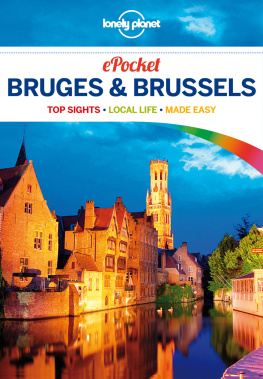The series Urban Notebooks/Stadsschriften/Cahiers Urbains treats subjects that deal with the city and urbanity in the large sense. The series is directed by an interdisciplinary editorial committee, made up of Eric Corijn (chair), Jessica van de Ven (editorial assistant), Maarten Loopmans, Rudi Janssens, Patrick Stouthuysen and Anne Winter.
Previous publications:
Eric Corijn & Eefje Vloeberghs: Bruxelles!, 2009.
Eric Corijn & Eefje Vloeberghs: Brussel!, 2009.
Benedikte Zitouni: Agglomrer. Une anatomie de lextension bruxelloise (1828-1915), 2010.
Margo De Koster, Bert De Munck, Hilde Greefs, Bart Willems & Anne Winter (Eds.): Werken aan de stad. Stedelijke actoren en structuren in de Zuidelijke Nederlanden, 1500-1900, 2011.
Eric Corijn, Kan de stad de wereld redden?, 2012.
Eric Corijn, Jean de Salle, Jean-Louis Genard, Christian Kesteloot, Christian Vandermotten & Pierre Vanderstraeten: O va Bruxelles?, 2013.
Eric Corijn, Jean de Salle, Jean-Louis Genard, Christian Kesteloot, Christian Vandermotten & Pierre Vanderstraeten: Waarheen met Brussel?, 2013.
Translations: Gaby Leyden, Jane Corrigan, Irene Shayler, Patrick Lennon, Ani Deal, Albion (Dirk Parijs), Bart Holsters and Philippe Bruel (Language Link).
Book design: Stphane de Schrevel
Cover image: ADT-ATO/Reporters (edited)
Print: Wilco, Amersfoort
@ 2013 VUBPRESS Brussels University Press
VUBPRESS is an imprint of ASP nv
(Academic and Scientific Publishers sa)
Ravensteingalerij 28
1000 Bruxelles
Tel. +32 (0)2 289 26 50
Fax +32 (0)2 289 26 59
E-mail
www.vubpress.be
ISBN 978 90 5718 176 4
NUR 740 / 758
Legal deposit D/2013/11.161/086
All rights reserved. No parts of this book may be reproduced or transmitted in any form or by any means, electronic, mechanical, photocopying, recording, or otherwise, without the prior written permission of the publisher.
Eric Corijn

Eric Corijn & Eefje Vloeberghs
Christian Vandermotten
Tim Cassiers

Claire Billen
Roel Jacobs

Caroline Van Wynsberghe

Christian Kesteloot
Sofie Vermeulen & Eric Corijn
Christian Vandermotten
Sarah Levy
Joachim Declerck & Roeland Dudal

Andrea Rea
Philippe Van Parijs

Geert Cochez, Leen De Spiegelaere & Veerle Vanderleen
Leen De Spiegelaere, Sophie Alexandre & Hannelore Smits
Gawan Fagard

Ann De Cannire, Marie-Laure Roggemans & Yves Rouyet
Eric Corijn
PREFACE: BRUSSELS FOR EUROPE

Eric Corijn
This story starts in late 2005 but its roots go back to 2001. That was the year that the Treaty of Nice was drawn up with the aim of reorganising the European Union to cope with its expansion to new member states. It is the year of the Belgian presidency and the report by 12 intellectuals entitled Brussels, Capital of Europe, commissioned by Romano Prodi and Guy Verhofstadt. And it is also the year of a three month-long occupation of the Luxemburg Station by urban activists in Brussels in order to discuss the European Quarter as the centre of the European unification process. Europe in Brussels and Brussels for Europe.
Europes presence in Brussels is not a complete success story. It has not fully integrated into the urban development. The growth of the institutions always occupied space without urbanism: one of the findings in the Prodi-Verhofstadt report is the feeble integration of European civil servants in urban life. But regardless of the history, Europe now plays an essential role in the dynamics of this city. In the span of a few decades the national industrial capital of Belgium became a well-connected world city, with the European functions as a driving force.
So, Europe is vital for any future scenario of Brussels. And this city is the living environment for the many thousands of expats working here. There is a need for more bridging between the two sides: Brussels needs more Europeanness in its profile and the Europeans should become better citizens of Brussels.
That was our thought in 2005 when we considered organising Masterclasses on Brussels for EU staff. It took us some time to find partners. The Brussels-Europe Liaison office immediately supported the idea and together we got the help of the Brussels regional government in the person of Minister Guy Vanhengel. Within both the universities, the Vrije Universiteit Brussel and the Universit libre de Bruxelles, we received full support from the rectors and we discussed the content with our colleague Prof. Dr. Serge Jaumain. Next we had to convince our public. The years 2006 and 2007 represent a long journey from visits with the human resources and training departments of the European institutions discussing our project and arguing for valuable training in the urban system , to becoming better co-producers in what was more than an introduction for newcomers to the functioning of the city. It was not until we found our partners in the European Administrative School, now EUSA, and its director David Walker that we could envisage putting the idea to the test. The programme was put together and the most highly ranked professors and experts accepted to contribute to the course.
The first series of Masterclasses for EU Staff started in the fall of 2008. Some 35 selected EU Staff from different institutions gathered in the premises of the Liaison Office for the first of 11 sessions. The modules vary in their organisation, featuring nine or ten classes on a range of subjects by the best experts in town coupled with three excursions to different parts of the city. Excursions include site visits and experiences of the Brussels arts scene. Many of the topics are complemented by panel discussions with politicians or urban activists. The multiple facets of this city are enlightened and analysed, always leaving time for questions and ample discussion.
A spin-off was created in the form of a series of lunch sessions for newcomers entitled Discover Brussels, held alternatively in English and in French and now attended by a few hundred new European civil servants.
In June 2013 we ended the tenth semester. Close to 350 staff members from various European institutions and also from other international offices have participated so far. They have all been fascinated by the insights into the urban dynamics and confronted with the interactions between the European unification process and the growth and construction of its capital. Most of them left as enthusiastic citizens of Brussels, aware of its many fragments and contradictions, but also of the many opportunities rising from its diversity and connections. The acquired passion led us to organise a network of Alumni from Brussels for Europe. Now and then, throughout the year, special meetings and events are organised. Many of the alumni have become active in discussions such as the Citizens Forum of Brussels or the Zinneke Parade.

